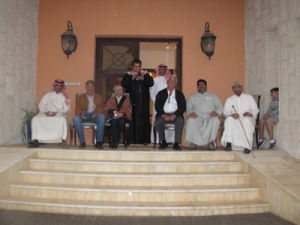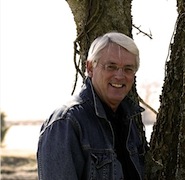 I last visited Kuwait in 1983. My company was then involved in developing and implementing a major computer system for the Kuwaiti government. I remember two things about that last visit. The water towers, two of them, now called the Kuwaiti Towers. I know, it seems a little odd that one would remember water towers, but these are no normal water towers. I guess you could call them designer water towers. They were and are architectural and design marvels. They guard the northern approach to the city as well as provide water to most of the central area of the city. I thought at the time that if you ever wanted to conquer Kuwait, all you would have to do is put a couple of pounds of plastique at the base, and then voila! No more water and no more Kuwait City, and since Kuwait City is Kuwait, bobs your uncle, you have conquered Kuwait. The second thing I remember is kissing the ground of wherever I went after Kuwait. I was really glad to get outta there.
I last visited Kuwait in 1983. My company was then involved in developing and implementing a major computer system for the Kuwaiti government. I remember two things about that last visit. The water towers, two of them, now called the Kuwaiti Towers. I know, it seems a little odd that one would remember water towers, but these are no normal water towers. I guess you could call them designer water towers. They were and are architectural and design marvels. They guard the northern approach to the city as well as provide water to most of the central area of the city. I thought at the time that if you ever wanted to conquer Kuwait, all you would have to do is put a couple of pounds of plastique at the base, and then voila! No more water and no more Kuwait City, and since Kuwait City is Kuwait, bobs your uncle, you have conquered Kuwait. The second thing I remember is kissing the ground of wherever I went after Kuwait. I was really glad to get outta there.
A lot has changed, but not the basics. Kuwait City is still pretty much the whole show, although it’s stretched out quite a bit. The desert still pretty much dominates everything else, and after Saudi Arabia, it is still the most conservative of the Arabian Peninsula countries. No booze but lots of tea. S.and I were there to visit Arabian horse breeders, and that we did from daylight to dark. In two days we visited nine different breeders, drove 2000 miles in the desert, drank 847 cups of tea, ate twelve pounds of dates and other assorted sweets, and met some of the most charming and knowledgeable horse people in the world. They hosted us with grace and treated us like honored guests. More about them later.
First a little on Kuwait. It has a population of about 3.5 million, but 68% are residents who don’t have and can’t get a Kuwaiti citizenship. There are more Indians than Kuwaitis. Go figure. Their system of government is called a constitutional monarchy, but don’t think UK. All the power is in the hands of the Sabah family and has been for generations. The senior Sabah (Al-Hamad Al-Jabel Sabah) is the Emir, and you’ll see a lot of other Sabahs in the most senior government positions. He appoints the prime minister and can dissolve what passes for their parliament whenever he wants, which he did as recently as 2009.
As you drive around Kuwait you see banners from every light pole and government building with the pictures of the the Emir and Prime Minister and the script 50/20/5. It’s not exactly intuitive but it’s meant to celebrate Kuwait’s independence from Great Britain in 1961, getting rid of Saddam in 1991, and the ascension to power of the latest Sabah in 2006. Get it. 50-20-5. I dunno. It makes sense to them. BTW, you should know that they’ve pretty much forgiven the Brits for making them have round-abouts every few blocks, but they’re not likely to forget or forgive Saddam and Iraq’s invasion of Kuwait in 1990. I’ve looked high and low for some explanation of why Saddam wanted Kuwait….more oil, another seaport, a ready supply of those cheese filled dates…but no one seems to know. He did some really bad stuff including shooting up the iconic Kuwait Water Towers and burning 773 oil wells on his way home.
There’s no doubt the economy is booming. It’s funny what having huge oil reserves will do for you, but there are those who say it’s not the same as it was before the invasion. They just don’t seem to have the go-go spunk that they did before they had to pay the US and others $17 billion to get rid of Saddam. That and the $50 billion or so they had to spend to rebuild their infrastructure. I guess if Saudi Arabia and Iraq were your two closest neighbors, that could make you look over your shoulder a lot.
Kuwait is 11th in the world in per capita income with 95% of their export income and 80% of total government income coming from the oil patch. You might wonder how Kuwait has avoided the “troubles” now plaguing several of it’s neighbors. It’s simple really. First, you announce that you’re giving every citizen $1000.00. Cold hard cash on the barrel head. Second, you announce that groceries are free…for two years. Yep, you heard me right. Groceries are free for all the Kuwaitis who, btw, are the 5th richest country in the world and have a per capita income of $8100. And what about the other 68% of the population who live in Kuwait, but don’t have Kuwaiti passports…nada. They get nothing but the proverbial Bronx cheer. So now we see that there are no flies on the Emir. He knows the way home so to speak. Appeal to their greed. Give them more money. Buy their loyalty. It’s worked pretty well so far.
One might surmise from reading the foregoing that I have a bit of a negative view on Kuwait. Oh contraire. Actually I found them to be more approachable, full of life, hospitable, and generally happy to share part of their life with you. Kuwait City doesn’t have the glitz (well, except the Water Towers) of Doha, Dubai or Abu Dhabi, but it suggests substance. It seems to me to have more humanity and less slipperiness. Yes, I know it’s a more than a little presumptuous to reach these conclusions after only three days in country, but then, I’ve always been a quick study. You know. Often wrong, but never in doubt. Let me tell you how I got there.
Most of the horse farms we visited were about an hour outside of Kuwait City which means they are in the desert or at least that one has to drive through a lot of desert to get there. And drive we did. Lots and lots of desert. I expected it to be empty and a lot of it was, but scattered around were compounds of tents with bits and pieces of supporting materials. Some portable potties, a few temporary fences. I thought at first that I was getting a first hand look at the ephemeral bedouin, those stateless people that continue to cause difficulties throughout the gulf. But no. These were weekenders. Kuwait City weekenders who wanted to return to their desert roots whenever and however they could. Think of the Dallas upper middle class family going to their lake house for the weekend. Except that this was the desert not Lake LBJ. You know, lots of sand, constant wind, herds of camels wandering by, a few four wheelers, the kids, and granny all in tents with no AC or running water. What did they do? Well, they sat around the campfire drinking tea, eating dates and talking about the good old days. I’m not talking about the odd extended family or two. I’m talking hundreds, maybe thousands of these weekend desert seekers. I’m told that if we had stopped by, they would have invited us to stay for a cup of tea and some turkish delight. I wish we had.
The second data point for my thesis is the breeders/owners that we visited. Obviously, if you’re in the horse business in Kuwait, you’re probably don’t need to wait for the Emir’s free groceries, but these guys were a thing apart. They didn’t turn over our de rigueur visit to the hired help. They met us at the gate, so to speak, and not only showed us their farm and their horses, they showed us more than a little of their life and their culture. They were all delightful, but one stands out. Usama A. comes from a family of successful businessmen and were connected to the Sheikhs that run the country, but he loves the desert and he loves his horses. He was larger than life in almost every way. You remember Anthony Quinn in his role of the Bedu chieftan Auda abu Tayi in Lawrence of Arabia. Usama was much more refined, of course, but he had the same magnetic personality. In order to see Usama’s horses you not only had to drive an hour into the desert, you had to endure and pass muster in a preliminary interview that he conducted in his majilis (an Arabic term meaning place of sitting). His was quite luxurious, but others of his tribe have their majilis in non-descript tents decorated with worn rugs and pillows. His could have been on Park Avenue. We talked about horses, and we talked about life. Mostly he talked and I listened. You realize how hard this was for me. Evidently I passed muster.
We proceeded to his presentation arena, and he asked if we wanted to sit in the indoor viewing enclosure or sit outside. Thankfully, I guessed right when I said that horses should be viewed in the fullness of nature. He had mentioned that he had 41 horses in the course of our interview, and he presented every single one of them to us. He did the presentation himself. No, he was not in the ring. His Moroccan trainer did that. He told us everything we wanted to know about the horse and more. He knew their pedigree to the third and often the fourth generation. It was obvious he appreciated and loved his horses, but he understood it was a business as well.
Finally the presentation came to an end and he excused himself for prayers. Yep. He went to pray. We hung around not knowing how long prayers would take, but the growling of our stomachs reminded us that it was almost two in the afternoon. Early for lunch for them perhaps, but way past my east Texas dinner time. We met again in his dinning room which adjoined the stable and ate the best meal of our trip. I won’t give you the details except to say that you should recall Anthony Quinn tearing off hunks of lamb for his guests and sucking bone marrow thereafter.
Oh, I should mention S. and how she fared in all of this. She is, as I’ve said before, a trooper. Maybe a reluctant trooper, but a trooper nevertheless. Usama knew his stuff when it came to the distaff side. He cooed and wooed and won her to his charm. He provided a beautiful wrap when the weather turned chilly, then gave it to her. He apologized for his wife not joining us. He insisted she have the first serving of every dish including the sheep brains which she ate without a qualm.
And yes, we ended with yet another cup of tea.


